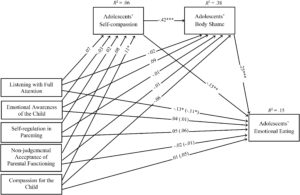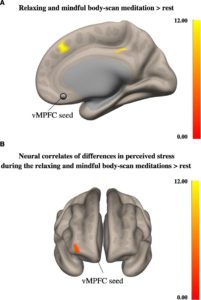Relieve Burnout in Practicing Psychologists with Mindful Self-Compassion Training
By John M. de Castro, Ph.D.
“Mindfulness interventions in the workplace target workplace functioning: reducing stress and improving decision-making, productivity, resilience, interpersonal communication, organizational relationships, perspective-taking, and self-care,”– M. Janssen
Stress is epidemic in the western workplace with almost two thirds of workers reporting high levels of stress at work. In high stress occupations, like healthcare, burnout is all too prevalent. Burnout is the fatigue, cynicism, emotional exhaustion, sleep disruption, and professional inefficacy that comes with work-related stress. It is estimated that over 45% of healthcare workers experience burnout. Currently, over a third of healthcare workers report that they are looking for a new job. It not only affects the healthcare providers personally, but also the patients, as it produces a loss of empathy and compassion. Burnout, in fact, it is a threat to the entire healthcare system as it contributes to the shortage of doctors and nurses.
Preventing burnout has to be a priority. Unfortunately, it is beyond the ability of the individual to change the environment to reduce stress and prevent burnout, so it is important that methods be found to reduce the individual’s responses to stress; to make the individual more resilient when high levels of stress occur. Contemplative practices have been shown to reduce the psychological and physiological responses to stress. Indeed, mindfulness has been shown to be helpful in treating and preventing burnout, increasing resilience, and improving sleep. Mindfulness is also known to improve self-compassion, understanding one’s own suffering. It is possible that this may be a key to understanding mindfulness’ effects on burnout.
In today’s Research News article “Mindful Self-Compassion Training Reduces Stress and Burnout Symptoms Among Practicing Psychologists: A Randomized Controlled Trial of a Brief Web-Based Intervention.” (See summary below or view the full text of the study at: https://www.frontiersin.org/articles/10.3389/fpsyg.2018.02340/full?utm_source=F-AAE&utm_medium=EMLF&utm_campaign=MRK_847629_69_Psycho_20181211_arts_A ), Eriksson and colleagues recruited practicing psychologists and randomly assigned them a wait list control condition or to receive mindful self-compassion training online for 6 weeks of 15 minute per day for 6 days per week. The program consisted of mindfulness exercises and compassion-focused exercises with 6 components, “(1) Kind attention, (2) Kind awareness, (3) Loving kindness with oneself and others, (4) Self-compassion—part 1, (5) Self-compassion—part 2, (6) Compassion with others and Quiet Practice.” The participants were measured before and after training for mindfulness, self-compassion, perceived stress, and burnout.
They found that compared to baseline and the wait-list control group, the group receiving mindful self-compassion training had significantly higher mindfulness and self-compassion and significantly lower self-coldness, perceived stress and burnout symptoms including fatigue, weariness, tension, and listlessness. They also found that the greater the change in self-compassion the greater the reduction in perceived stress and burnout. This suggests that improvements in self-compassion are an important consequence of mindfulness training in reducing burnout.
The fact that the program was delivered online and only involved 15 minutes per day is important for the engagement of busy professionals. This resulted in about 4 out of 5 psychologists successfully completing the program. Importantly, the observed sizes of the effects of the training were comparable to those seen in studies employing face-to-face training. Hence, offering the program online appeared to have the major advantages of convenience and wide availability without reducing effectiveness.
These results suggest that mindful self-compassion training delivered online is effective in reducing the symptoms of burnout in practicing psychologists. This should not only relieve the suffering of the psychologists but also make them more effective in relieving the suffering of their clients.
So, relieve burnout in practicing psychologists with mindful self-compassion training.
“Self-compassion enhances our careers by increasing our motivation,16 encouraging us to take risks without fear of failure, to persist despite obstacles; it fosters personal growth, and even reduces medical errors.” – Laurie Keefer
CMCS – Center for Mindfulness and Contemplative Studies
This and other Contemplative Studies posts are also available on Google+ https://plus.google.com/106784388191201299496/posts and on Twitter @MindfulResearch
Study Summary
Eriksson T, Germundsjö L, Åström E and Rönnlund M (2018) Mindful Self-Compassion Training Reduces Stress and Burnout Symptoms Among Practicing Psychologists: A Randomized Controlled Trial of a Brief Web-Based Intervention. Front. Psychol. 9:2340. doi: 10.3389/fpsyg.2018.02340
Objective: The aims of this study were (a) to examine the effects of a 6 weeks web-based mindful self-compassion program on stress and burnout symptoms in a group of practicing psychologists, and (b) to examine relationships between changes in self-compassion and self-coldness and changes in stress and burnout symptoms.
Method: In a randomized controlled trial, 101 practicing psychologists were assigned to a training group (n = 51) or a wait-list control group (n = 49). The training encompassed 15 min exercises per day, 6 days a week, for 6 weeks. The participants completed the Self-Compassion Scale (SCS), the Five Facets of Mindfulness Questionnaire (FFMQ), the Perceived Stress Scale (PSS), and the Shirom Melamed Burnout Questionnaire (SMBQ) pre and post intervention.
Results: Eighty-one participants (n = 40 in the training group, n = 41 in the control group) took part in the pre and post intervention assessments. Selective gains for the intervention group were observed for SCS total scores (d = 0.86; d = 0.94 for the SCS), FFMQ scores (d = 0.60), while levels of self-coldness was reduced (d = 0.73). Critically, levels of perceived stress (d = 0.59) and burnout symptoms (d = 0.44 for SMBQ total) were additionally lowered post intervention. Finally, the results confirmed the hypothesis that the measures of distress would be more strongly related to self-coldness than self-compassion, a pattern seen in cross-sectional analyses and, for burnout, also in the longitudinal analyses.
Conclusions: This training program appeared effective to increase self-compassion/reduce self-coldness, and to alleviate stress and symptoms of burnout and provide support of the distinction between self-compassion and self-coldness. Additional studies, preferably three-armed RCTs with long-term follow-up, are warranted to further evaluate the effectiveness of the program.









